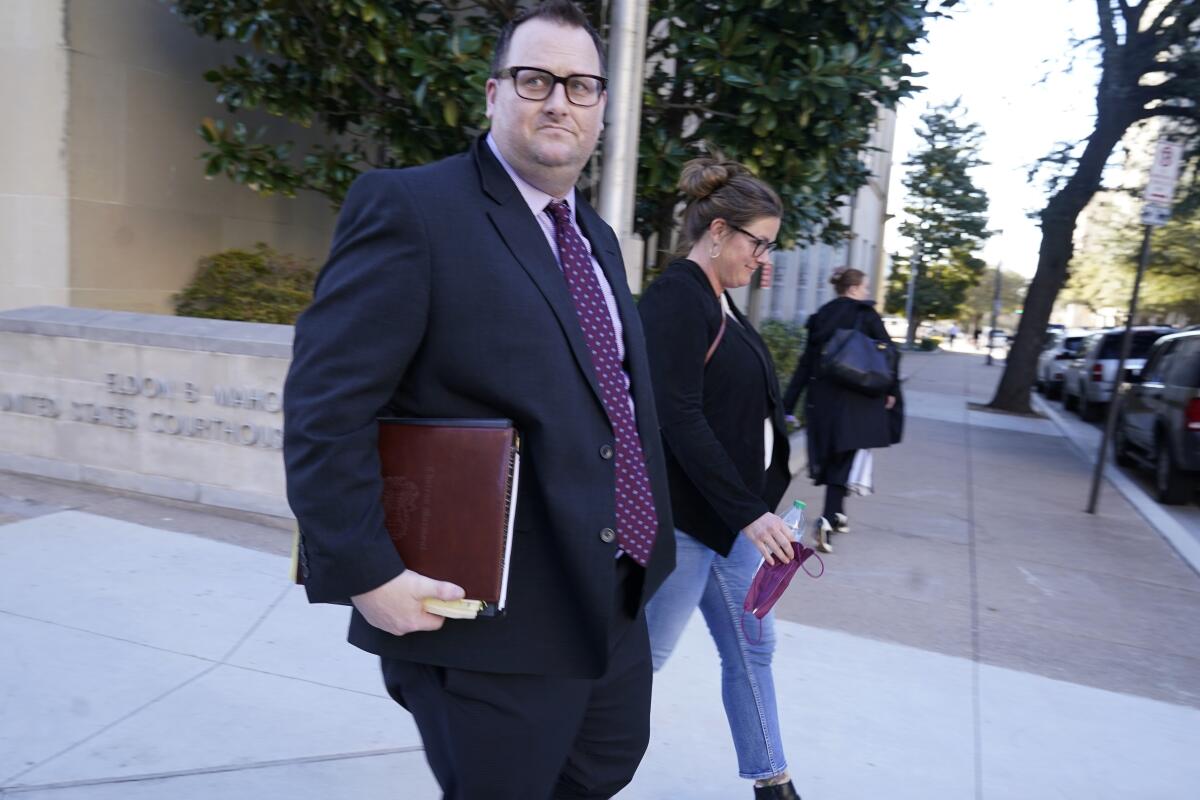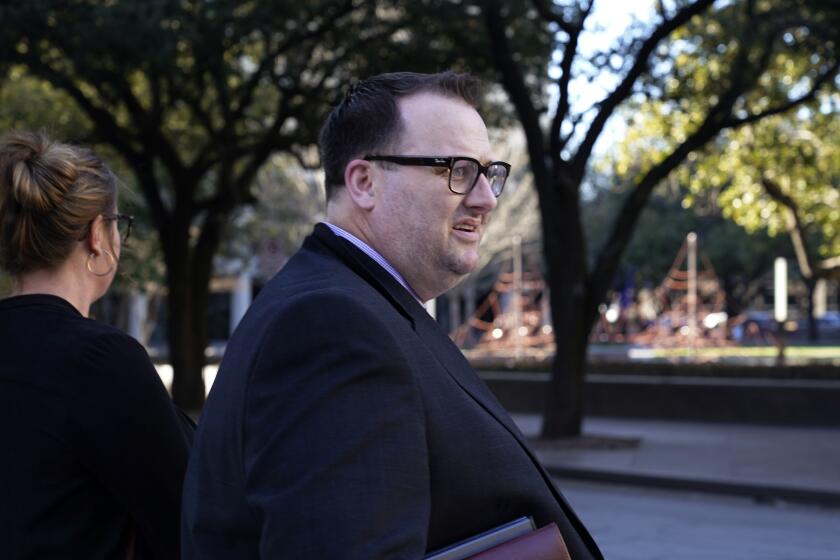Eric Kay verdict is the start of a long, sad road for Angels, MLB and Skaggs family

- Share via
FORT WORTH — In the very first sentence of its closing statement Thursday, the federal government made clear what it believed this trial was all about.
“This case,” assistant U.S. attorney Lindsey Beran told the jury, “was about one person.”
That person is Eric Kay, the former Angels publicist convicted of giving Tyler Skaggs the fentanyl-laced pills that killed him. Kay was not a high-ranking executive, a coach, certainly not a famous player. He was a troubled mid-level employee linked to a tragedy and, now, to a sentence of 20 years to life. This particular trial might have been about one defendant, but the impacts of the trial will extend far beyond one person.
The guilty verdicts delivered Thursday were the first in what could be a painful and prolonged series of reckonings for the Angels, for Major League Baseball, and for the Skaggs family. The involvement of high-profile players and a deep-pocketed team mean this is the end of a chapter, not the end of the story.
With the trial concluded, MLB plans to launch its own investigation, a league official told The Los Angeles Times, requesting anonymity since no formal announcement has been made. Testimony from the trial will play a significant role in the MLB investigation, and in two wrongful-death lawsuits that the Skaggs family has filed against the Angels, one in California and one in Texas.
“It is obviously a bad day for the Angels, who have given a black eye to our National Pastime,” Rusty Hardin, the attorney for the Skaggs family, said in a statement.
The investigation, and even moreso the lawsuits, will focus on these questions: What did the Angels know, and when did they know it?
A Texas jury finds former Angels employee Eric Kay guilty on the charge of giving pitcher Tyler Skaggs the drugs that led to his fatal overdose.
“The players’ testimony was incredibly difficult for our organization to hear,” Angels President John Carpino said in a statement, “and it is a reminder that too often drug use and addiction are hidden away.”
That indeed is too often the case. In this case, however, testimony from the Kay trial suggests drug use and addiction were not hidden away among the Angels.
Matt Harvey said he used opioids in the dugout, and in the clubhouse. He said Skaggs used opioids in the clubhouse bathroom. C.J. Cron said Kay would put opioids in his clubhouse locker.
Kay used various suppliers, his attorneys argued, including an Angel Stadium clubhouse attendant. In filing the wrongful-death lawsuits, attorneys for the Skaggs family alleged Kay had furnished illegal drugs to at least five Angels players — and testimony here validated that allegation.
“The trial showed Eric Kay’s drug trafficking was known to numerous people in the Angels organization, and it resulted in the tragic and unnecessary death of one of their most popular players,” Hardin said in his statement. “We have no doubt that the Angels knew what Eric Kay was doing, and the team is morally and legally responsible for his conduct. In the upcoming civil cases, we are looking forward to holding the team accountable.”

The Angels have previously said they conducted an investigation and found no evidence team management was “aware or informed of any employee providing opioids to any player.”
The MLB investigation is expected to consider whether there is an opioid issue within the Angels and within the league. After Skaggs died, the league started testing for opioids. In the first two years of testing, a league official said, no player violated the MLB drug policy because of a positive test for opioids.
The wrongful-death lawsuits claim the Angels — at least before Skaggs’ death — maintained “a toxic environment that pressured players to play through injuries.” With players testifying here that they used opioids as painkillers in order to stay on the field, assistant U.S. attorney Errin Martin said, “There’s no question the MLB system is broken. They have to play. They have to do whatever it takes to play.”
In 1998, when the Associated Press reported Mark McGwire had a bottle of a since-banned testosterone-producing aid called androstenedione in his locker, the report triggered anguish but no immediate action toward a steroid testing program in MLB.
At the Eric Kay trial Tuesday, four former Angels testified to receiving oxycodone pills from the team’s former communications director.
Kay allegedly put opioids in Cron’s locker, but the subsequent opioid testing might have resolved the issue, for the Angels and for MLB. We’ll see. The trouble for MLB is that civil suits can take years to resolve, so in theory the league could be forced to choose between wrapping up its investigation in a timely manner, or letting it linger for years to get the benefit of whatever information might be revealed in the wrongful-death suits.
There are all kinds of pretrial skirmishes now, about where a trial should take place, and which lawyer should be allowed to represent the Skaggs family, and whether a suit should be thrown out entirely.
The road ahead is long, and Thursday’s verdict puts an uncomfortable spotlight on a disturbing question: Should the Angels be held liable for the death of one of their players?
More to Read
Go beyond the scoreboard
Get the latest on L.A.'s teams in the daily Sports Report newsletter.
You may occasionally receive promotional content from the Los Angeles Times.









